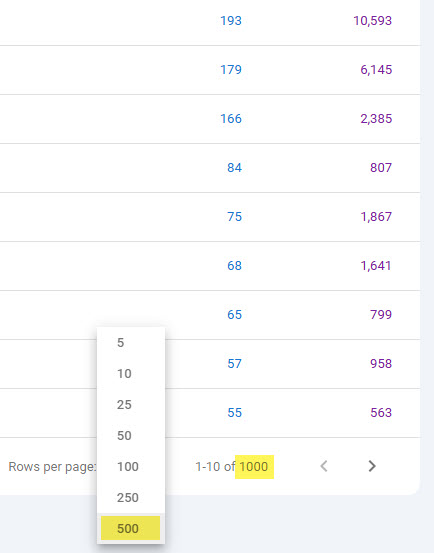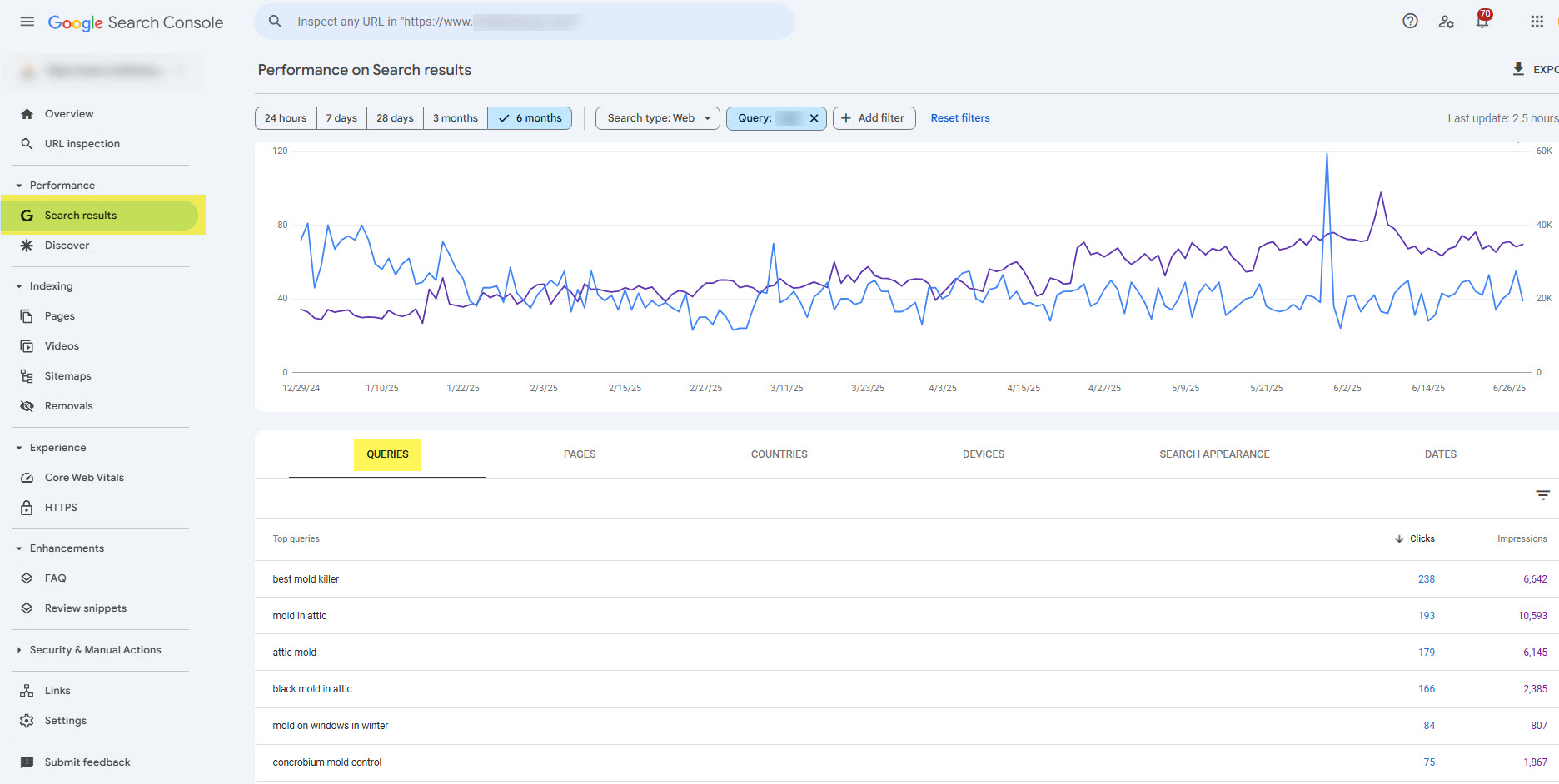An “accidental ranking” is just what it sounds like: a term you’ve ranked for without even trying. Not all accidental rankings are useful, but you’ll find some that turn into some of your strongest local rankings once you start trying to show up for them.
What I suggest is simple:
1. Sift through the Google Search Console “Queries” report and find search terms your business ranks for that you haven’t targeted and that you think have value.
2. Target those terms a little more on the pages that already rank for the “accidental” terms, on your most-visible other pages, on your homepage, or on some combination. (Often this is as simple as adding a paragraph on whatever the topic is, and maybe throwing the “accidental” term into the title tag.)
3. Create other pages or maybe even YouTube videos to target the “accidental” terms more deliberately.
That’s all there is to it. The idea is to a small lucky break and try to make it into a bigger lucky break. It’s a tried-and-true process. Humans, critters, plants, bacteria, and other living things evolve through a series of accidents – by little genetic mutations that, over the eons, turn out to be bugs or features. In some ways, your business is also a living thing. With accidental rankings you’re just trying to grow an extra claw, tooth, antennae, antibody, colorful feather, or double joint that helps you survive your brutal environment.
Here’s the money area of Search Console (“Search results,” then “Queries”):
Look through the entire “Queries” report for your entire site (all pages). Search Console will show you up to 1000 terms that have produced some impressions (i.e. rankings). Go to the very end, through all 1000 through or however many Search Console shows you. It’s kind of fun, but if you find it tedious assign it to your sous chef or to your SEO person.

A few examples of situations where my clients and I used accidental rankings to wring out more local visibility:
a. A generator-service company was ranking for a mishmash of terms regarding specific outputs of whole-home generators (e.g. 18kW). We then created a page on each size of generator they service, repair, and install (e.g. 18kW Generac, 24kW Generac, etc.). Those started ranking, too, and increased our search impressions by about 50%, and increased the clicks somewhat, over the past few months.
b. An immigration attorney was ranking for ton of terms regarding specific USCIS immigration forms and questions that would-be clients have. The pages that “accidentally” ranked for those terms were for certain kinds of visas (e.g. marriage, work, etc.) and applications (e.g. citizenship). We doubled down on her visibility for them by creating both pages and YouTube videos on those topics, and quadrupled down by doing so both in English and in Spanish.
c. An ecommerce print shop was ranking for various “manuals,” “pamphlets,” “coloring books,” and synonyms of binding options that we hadn’t thought of. We broadened some of our pages to focus on those terms more, and created other pages. Both came in handy when our rankings for other, broader, search terms went down for a while, because the “accidental” rankings we started targeting made up for that visibility (plus some).
Some notes that can help you get the most out of your accidental rankings:
- You must do this in Google Search Console. Google Analytics data, particularly in the age of GA4, is worthless for most search-visibility analyses. That’s for two main reasons: (a) Analytics only shows you the traffic (i.e. clicks) you get, rather than the visibility (i.e. impressions) that produce those clicks, and (b) these days it doesn’t even show you most of the specific terms that yield clicks.
- It’s an ongoing process. As you dig through the Search Console data over the months and years, you’ll notice new accidental rankings, some of which will be worth your time and toil.
- You’ll probably rank for accidental terms more easily, more quickly, and farther away than you will for the terms you’re really gunning for. But it’s not mutually exclusive: you can rank for both the big terms and for the smaller ones. Your survival might depend on eating the slow rabbits and clumsy deer until you bury a spear in the woolly mammoth.
- In many cases you’ll pop your Google Business Profile page into the Google Maps results, in addition to the organic results (which include AI Mode results). Either you’ll rank for a term you didn’t rank for on the map before, or you’ll bump yourself up the pecking order (like in cases where you already ranked #7 on Maps).
- In most cases you’ll find that it’s easier and quicker to get the already-ranking page to rank higher for the accidental search term than to try to get a new page, video, or other asset to rank for that term for the first time. In general I suggest you do both, though
- Sometimes all you need to do to double down on an accidental ranking is to double down on your internal links to the page that ranks for that term. Here I suggest checking the “Links” report in Search Console to see whether some pages are slim on internal links pointing to them.
- After you’ve expanded a page, further optimized a page, or created a page to target an accidental search term, check back in Search Console a month or two later and see what’s in the net. Your impressions will probably increase before your clicks increase, but both might rise roughly at the same time.
- It’s especially interesting when you’ve got a multi-location business, one with multiple GBP pages, because you can compare which locations rank for this or that accidental search term and which locations rank better for that accidental term once you start hammering away at it. Be sure to put a tracking link on each GBP landing page URL, so that you can see in Search Console the specific terms that each GBP page ranks for in Google Maps.
- Filter the results you see by going to “Pages” and adding a filter that contains the word “PDF” or the name of whatever subdirectory your site’s photos reside in (e.g. “wp-content”). You might discover that a PDF you uploaded or a media-file page ranks for a good search term – one you can target easily elsewhere on your site.
- Sometimes your targeting an accidental term will produce another unexpected result: it may help you start ranking for a competitive term that you’ve tried all too hard to rank for. Don’t count on it, but don’t count out the possibility, either. The basic principle at work here is that Google is a little unpredictable in how and when it chooses to rank you for this or that term.
Don’t think too hard about any of this. You probably won’t need to perform major surgery on your site to grow your accidental rankings. Try picking on a couple of accidental search terms, see what happens, and then try a couple of others. It can be the start of a pretty cool chain reaction.
Have you found any good accidental rankings and developed your visibility for those terms? What’s worked (or hasn’t)? Have you run into a challenge and aren’t sure what to do next in your specific case? Leave a comment!


